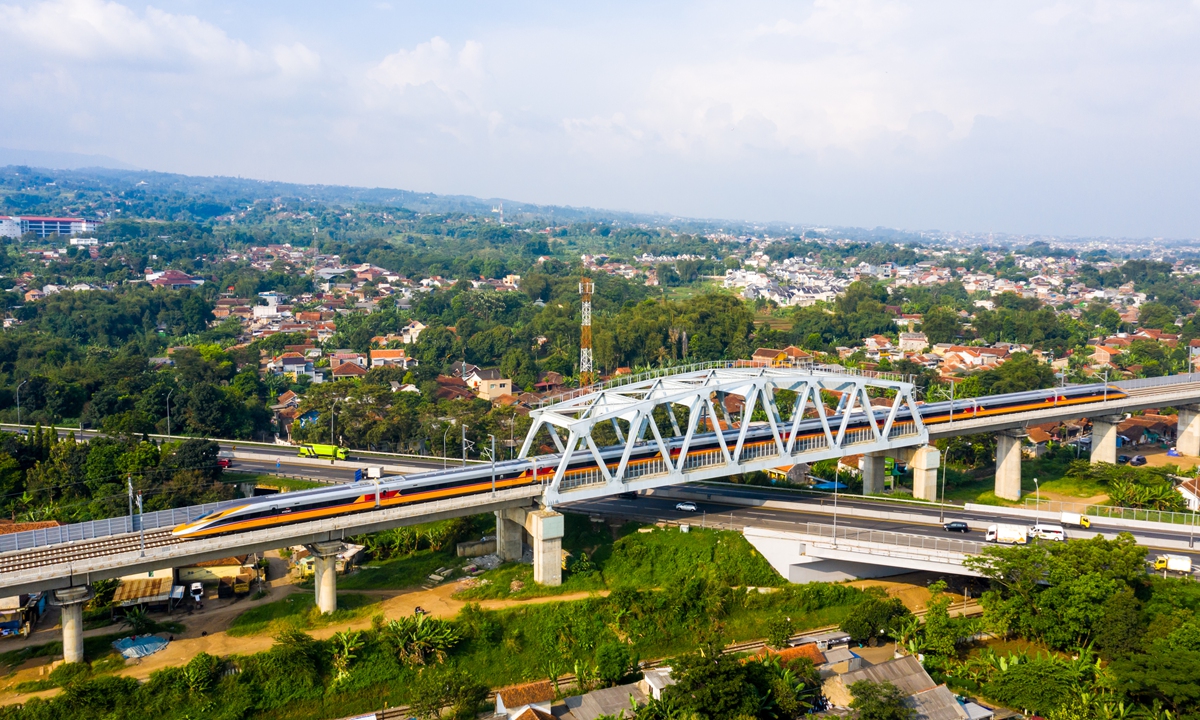
A train undergoes a joint test run to fine-tune all its systems to ensure safe operations on the Jakarta-Bandung High-Speed Railway, a signature project between China and Indonesia under the China-proposed Belt and Road Initiative, on May 22, 2023. The railway is set to be operational in the middle of this year. Photo: Courtesy of China State Railway Group Corp
The Indonesian side will continue its efforts to meet the deadline for the commercial launch of the long-awaited Jakarta-Bandung High-Speed Railway (HSR) in August despite delays during the pandemic and other headwinds, a senior Indonesian official said on Monday.
"We know there are always discussions or confrontations between people at the technical level and people at the political level… We need to strike a balance on what's more important," Santo Darmosumarto, director for East Asian Affairs of the Ministry of Foreign Affairs Indonesia, told the Global Times amid a lecture held by the Center for Southeast Asian Studies at the Chinese Academy of Social Sciences (CASS) in Beijing.
Darmosumarto reiterated the continuous efforts of the Indonesian side to try to meet the deadline.
A Reuters report earlier this month said that Indonesia's transport ministry and three consultants had pushed back a plan to start full commercial operations of the HSR in August, citing an internal document.
Indonesia is negotiating with China on an additional $560 million loan and asking for an interest rate of 2.8 percent for the portion of the loan in yuan, which is lower than the China Development Bank's offer of 3.46 percent, the report said, citing another set of documents.
Darmosumarto said he is not fully aware of the progress of the new loans, but "there are discussions being carried out."
"For the project, there were a lot of unexpected conditions along the way… there were certain things that were not seen at the time that now require us to pay more attention, that's why there are more and more efforts to make sure the project is safe," Darmosumarto said.
The Jakarta-Bandung HSR, which connects Indonesia's capital Jakarta and its fourth-largest city Bandung, is a landmark project under the China-proposed Belt and Road Initiative (BRI) and an example of practical cooperation between China and Indonesia.
As the first high-speed railway in Southeast Asia with a designed speed of 350 kilometers per hour, the railway will cut the journey between Jakarta and Bandung from more than 3 hours to around 40 minutes.
The signature project has been hyped repeatedly by Western media over such issues as delays and cost over-runs, causing malicious slander against cooperation between China and Southeast Asian countries under the BRI.
Xu Liping, director of the Center for Southeast Asian Studies at the CASS, told the Global Times on Monday that delays and additional costs have been common phenomena for high-speed railway projects globally, especially during the pandemic.
"There is not much difference between the two countries on the Jakarta-Bandung HSR," Xu noted.
The joint commissioning and testing of the HSR, which is usually conducted prior to the opening to ensure safe and smooth operation, started in May, a milestone in the construction of the project, the Xinhua News Agency reported, adding that preparations for operation are being carried out in an orderly manner.
As to prospects of China-Indonesia cooperation under the BRI, Darmosumarto remains optimistic.
"Cooperation between the two countries is positive in many areas, for example, Indonesia is planning to build a new capital city.
"We are intending to move [the facilities of] Jakarta to a different island, another big infrastructure project, which will be quite positive for our long-term cooperation," he noted, where China can leverage its manufacturing advantages.
In addition, Indonesia is keen on developing the electric vehicle industry, and cooperation with Chinese firms, which have already established a footprint in the Southeast Asian country, has a lot of potential, Darmosumarto said.
In 2022, China remained the second-largest source of foreign investment for Indonesia (excluding investment from China's Hong Kong SAR), with a record of $8.8 billion.
In the first quarter of this year, bilateral trade came in at $31.91 billion, up 10.1 percent on a yearly basis, data from Indonesia showed.




